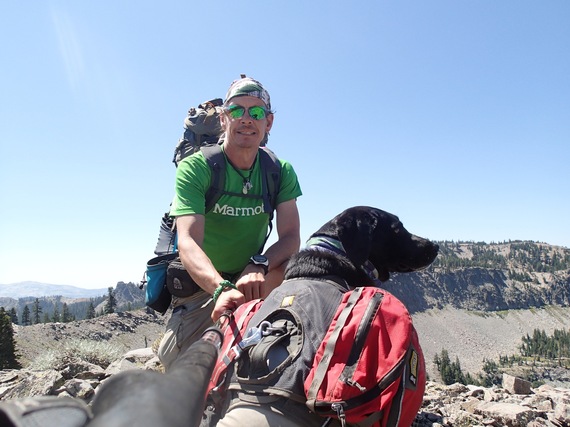At age 35 Trevor Thomas heard he was turning completely blind. Within eight months, his world shut down around him. Through long-distance walking Trevor rebuilt his life, becoming the first blind person to thru-hike all of the Appalachian Trail (2,200 miles), followed by a range of other very long walks. He is the founder of Team Farsight which challenges misconceptions about the abilities of the blind and visually impaired.
1.What does walking mean to you?
Walking is everything for me. Obviously going blind, I am no longer able to drive a car. For me it is independence. If I want to keep my independence I walk. I am the only blind professional long-distance walker in the world. It is not only mobility or exercise. It is empowerment.
2.You turned blind very suddenly. How has walking helped you deal with blindness?
Hiking literally gave me my life back. Hiking gave me confidence, mobility, and independence. And ironically enough it gave me a career that nobody else has. It turned something that many people view as a horrible negative into a positive. I owe it all to taking that first step and walking into the unknown: first out of my front door, and later on a long-distance trail that I had never walked before.
3.You have accomplished so much individually as the Blind Hiker. Why did you start Team Farsight?
I started TF as a way to start giving back. After I walked the Appalachian Trail, people started saying "what is next?". While I was on the AT I decided that this is what I love: every single day was different, a living expedition, a wonderful healing experience. I wanted to do the next progression of America's long-distance hikes: the Pacific Crest Trail. But fewer people start the PCT than finish the AT. On a trail that is so primitive, remote and rugged, I needed a team.
The systems for dealing with the blind are antiquated. Society says "you can't do that as a blind person". Expectations are low.
Hence Team Farsight was born: to assist me where I need it, but also to make a broader impact. I want to show society that blind people actually can achieve things. The systems for dealing with the blind are antiquated. Society says "you can't do that as a blind person". Expectations are low. The unemployment rate among blind people is 96%. Blind kids are not encouraged to do things that other - "normal" - kids do. But they love the opportunity to be a normal kid and go out and hike. We want to break down the barriers between the sighted and the blind community.
4.What can sighted walkers learn from blind walkers?
People say "why do you hike these long trails since you cannot enjoy the view from the top of the mountain?". My answer is that I am actually fortunate because I do not rely on my sight. I don't have the experience that you can get on a postcard at the ranger station. But I have a more robust experience. First, it takes me ten times the effort to get to the top so I appreciate it more. And then, when I get there, I remember the things that nobody else does: the smell, if the wind was blowing. I remember if the sun was shining on the right side of my face, whether it was raining or crisp. It gives me a very multidimensional experience that most sighted people will overlook. The one thing I wish sighted people would do is pay attention to the other senses.
5.What is your next challenge hiking blind ?
Tennille (Trevor's guide dog) and I are getting ready to thru-hike the Colorado Trail. That is 500 miles over the Rockies at the extreme altitude of 10,000-14,000 feet. We're almost guaranteed not to run into another person while we are out there. I want to continue to push the limits of what we are doing, just to show that it can be done.
It can be inherently dangerous. I have very supportive friends, followers and family, but they do know the risks involved, even when you are sighted. I find the risks acceptable and frankly, I feel safer in the backcountry than I do walking down a very busy street in Charlotte, NC. I rather deal with a bear than I deal with some driver not paying attention and texting.
Trevor Thomas is presently hiking the Colorado Trail: http://www.blindhikertrevorthomas.com
